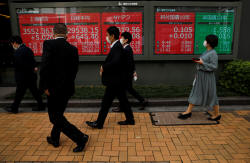Asian shares drop as bond yields rise ahead of Fed
 Send a link to a friend
Send a link to a friend
 [January 18, 2022] By
Scott Murdoch [January 18, 2022] By
Scott Murdoch
MELBOURNE (Reuters) - Asia's share markets
turned negative on Tuesday as two-year U.S. Treasury yields topped 1%
for the first time in almost two years with investors weighing the risks
of a Fed policy rate rise as soon as March.
Early European markets on Tuesday were also slightly weaker.
However, oil prices rose to their highest level in more than seven years
over concerns about supply shocks after Yemen's Houthi group attacked
the United Arab Emirates.
MSCI's broadest index of Asia-Pacific shares outside Japan edged higher
earlier in the session as much as 0.4%, before turning down 0.45% in the
afternoon.
Each of the region's major markets, apart from some Chinese indexes,
gave up their earlier gains.
Australian shares fell 0.11%, while in China the blue chip CSI300 Index
bucked the trend to stand 0.7% higher.
Hong Kong's Hang Seng Index swung from a 0.6% gain to trade down 0.42%.
Japan's Nikkei dropped 0.23%.
The turn in sentiment came after two-year U.S. Treasury yields, a
bellwether for rate expectations, rose above 1% for the first time since
February 2020. The yields stood at 1.0364% in the Asia afternoon.

Benchmark 10-year yields gained nearly 6 basis points (bps) to 1.855%.
In early European stock trading, the pan-region Euro Stoxx 50 futures
slid 0.38% to 4,276.5, German DAX futures fell 0.22% to 15,893 and FTSE
futures were off 0.17% at 7,538.5.
U.S. stock futures, the S&P 500 e-minis, were down 0.47% at 4,633%.
The U.S. Federal Reserve is not expected to change rates at its Jan.
25-26 meeting but a growing number of investors think March will be the
start of a tightening cycle.
"Investors' focus remains on the Fed and the pace at which they raise
rates," John Milroy, adviser at brokerage Ord Minnett in Sydney, told
Reuters.
"We think it will be faster than markets currently expect. Boom
conditions remain in the U.S. with a tight labour market. Good for world
growth but adds to the inflationary pressures."
[to top of second column] |

Passersby wearing protective face masks walk past an electronic
board displaying world stock indexes, amid the coronavirus disease
(COVID-19) pandemic, in Tokyo, Japan November 1, 2021. REUTERS/Issei
Kato

Elizabeth Tian, Citigroup's equity derivatives director, said equities markets
were reacting to the bond market moves.
"There are fears there are more aggressive and quicker rate hikes by the Fed
coming," she said.
"The Fed is turning more hawkish and there is a lot of focus on that, but we
think in the short-term equities market there should be more support because of
the value of central bank liquidity that exists now," she said.
"We're saying it's too early because of the liquidity to be too bearish and it
should be more of selling into the rally."
The dollar index, which tracks the greenback against a basket of currencies of
major trading partners, was up at 95.33.
Brent crude rose to $87.33 per barrel, up 1% and just off a peak hit earlier in
the day of $87.55, the highest price since October 2014. U.S. crude ticked up
1.32% to $84.93 a barrel.
An air strike killed about 14 people in a building in the Yemeni capital of
Sanaa, residents said on Tuesday, during strikes across the city launched by the
Saudi-led coalition fighting the Houthi group.
The alliance strikes on Houthi-held Sanaa followed an attack claimed by the
Iran-aligned Houthis on Monday on coalition partner the United Arab Emirates, in
Abu Dhabi, in which three people were killed.
The "new geopolitical tension added to ongoing signs of tightness across the
market," ANZ Research analysts said in a note.
Gold was slightly lower. Spot gold traded at $1,817.1642 per ounce. [GOL/]
(Reporting by Scott Murdoch in Melbourne; Editing by Neil Fullick)
[© 2022 Thomson Reuters. All rights
reserved.]This material may not be published,
broadcast, rewritten or redistributed.
Thompson Reuters is solely responsible for this content.
 |